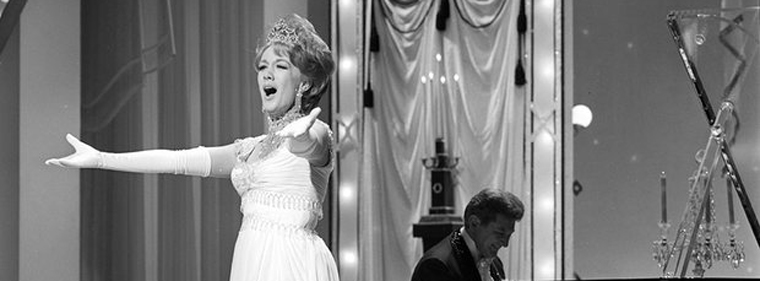In Memoriam MARNI NIXON
Marni Nixon
The 'ghost' who sang for Audrey Hepburn in My Fair Lady, for Deborah Kerr in The King and I and for Natalie Wood in West Side Story

| Millions of filmgoers who enjoyed the singing of Deborah Kerr in The King and I (1956), Natalie Wood in West Side Story (1961) and Audrey Hepburn in My Fair Lady (1964) were unaware that their voices were dubbed by Marni Nixon, who has died of breast cancer aged 86.
In order to keep the illusion a secret, the extraordinarily versatile American coloratura soprano was uncredited. It was only some years later, after the heyday of the Hollywood musical had passed, that the curtains were figuratively pulled back to reveal Nixon at a microphone behind the scenes. In film circles, this most unsung of singers was dubbed the "ghostess with the mostest". However, in classical music circles, Nixon was well known for her wide range of recordings and opera performances, notably at the Los Angeles, Seattle and San Francisco opera companies, where she performed, among others, Zerbinetta in Ariadne auf Naxos, Susanna in Le Nozze di Figaro, both Blonde and Konstanze in Die Entführung aus dem Serail and Violetta in La Traviata. Nixon also sang with the New York Philharmonic under Leonard Bernstein, the Los Angeles Philharmonic, and the London Symphony Orchestra. In addition, she gave a series of lieder recitals, specialising in fiendishly difficult modern works by Igor Stravinsky, Arnold Schoenberg and Anton Webern; and Pierre Boulez's Improvisation sur Mallarmé I under Bernstein, a world away from Getting to Know You (The King and I), I Feel Pretty (West Side Story) and I Could Have Danced All Night (My Fair Lady). Nixon singing in a tribute concert for Lerner and Loewe in 2008. She was born in California as Margaret Nixon McEathron, the daughter of Charles Nixon and Margaret McEathron (nee Wittke). Her parents encouraged her singing when they discovered that she had perfect pitch and impeccable sight-reading skills from a very young age. She began a singing career at 19, later studying opera performance with Carl Ebert and Sarah Caldwell. Nixon's association with movies began when she dubbed the singing voice of the child star Margaret O'Brien in Big City (1948) and The Secret Garden (1949). In the former, Nixon immediately demonstrated her talent for mimicry by imitating the 10-year-old O'Brien taking off the nightclub singer Betty Garrett. "It was just a part of the working singer's job in Hollywood to do anything that was necessary and a lot of dubbing was going on," Nixon explained. "It also helped subsidise my 'serious' singing career." In 1953, Nixon was asked to dub Marilyn Monroe's high notes in the number Diamonds Are a Girl's Best Friend, from Gentlemen Prefer Blondes. Most of the song is in Monroe's own voice but she needed help in two phrases: "These rocks don't lose their shape, diamonds are a girl's best friend", and at the beginning with a series of high-pitched "nos". |
Nixon worked for about a month with Deborah Kerr on The King and I, managing to replicate Kerr's distinctive "ladylike" accent seamlessly in song. "Deborah wanted also to look like she was really singing and wanted to be seen using the same muscles. I stretched my neck in the same way and altered the shape of my mouth to emulate hers," Nixon recalled. Both Wood and Hepburn initially resented Nixon "stealing" their voices, thinking that they could handle the songs adequately themselves. In fact, Wood thought that Nixon was brought in on West Side Story merely to dub in the occasional high notes. When Wood realised that Nixon would be doing all the singing, she walked off the set. But when she heard Nixon's interpretation of Tonight, she knew she could never equal it. Curiously, Nixon was hired to dub Rita Moreno in the same film, in a reprise of Tonight, in harmony with her voice for Wood, having to distinguish each voice from the other using different timbres. Nixon never got any credit for her work on the film of West Side Story, although she did get royalties for the bestselling record of the soundtrack.
Nixon's brilliance reached its peak in My Fair Lady, by having to replicate Hepburn's voice as the cockney Eliza Doolittle in Wouldn't It Be Loverly and then singing with a posh accent, after the character's transformation, in I Could Have Danced All Night. One of Nixon's few appearances in films was in the small part of Sister Sophia in The Sound of Music (1965), singing Maria with three other nuns, getting the solo line: "She waltzes on her way to mass and whistles on the stair. As film musicals became more pop-based, there was less work for a vocal stand-in like Nixon. Her last movie voice job was as the grandmother in the Disney animation Mulan (1998), singing Honour to Us All. On stage, she toured as Fräulein Schneider in Cabaret (1997–98), and appeared in productions of The King and I and The Sound of Music; she played the Nurse in Romeo and Juliet off Broadway, and was on Broadway in 2000 as Aunt Kate in James Joyce's The Dead. All the while, she continued to teach voice. Nixon was married three times, first to the film composer Ernest Gold, with whom she had a son, the singer-songwriter Andrew Gold (who died in 2011), and two daughters, Martha and Melani, and then to Lajos Fenster; both these marriages ended in divorce. Her third husband, the flautist Albert Block, died in 2015. She is survived by her daughters. • Marni Nixon (Margaret Nixon McEathron), singer, born 22 February 1930; died 24 July 2016 Ronald Bergan |

